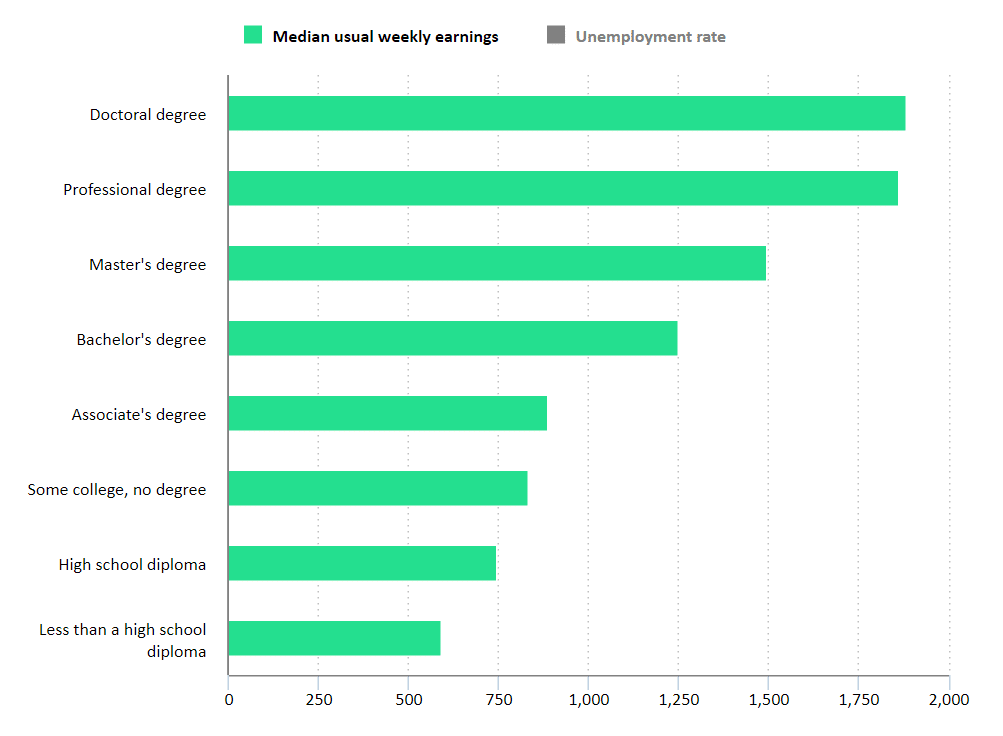A debate over the importance of higher education continues to rage in the education community. People are asking whether the investment in getting a higher education is worth it. To get some answers, let us compare how much someone with a bachelor’s degree makes and someone without such.
A joint study by Georgetown University and the Center on Education showed that full-time workers with bachelor’s degrees get 84 percent greater income throughout employment than high school graduates. This statistic indicates the big gap in salary between these two types of workers.
After college, you have the option to continue your studies on your terms. You can do this around your work schedule or even during weekends. Apart from the security of tenure, an advanced education affords you the chance to experience a life-changing journey that could impact your life forever.
Before we go any further, let us review the different levels of education and understand some key facts about each. Later we will see the advantages of having high educational attainment in monetary return.
Fast facts about educational attainment
Education plays an important role in shaping a person’s character and in getting a good career opportunity. It can provide you with job security and will make you independent. Although education is available to all, not everyone has the means to get an education, especially at a higher level.
Keep in mind that there are five educational levels most people undergo. We do not consider here the pre-school and primary school levels in our discussion of return on investment. We will talk about the following levels only:
- High school diploma
- Associate degree
- Bachelor’s degree
- Master’s degree
- Doctoral degree

Getting a graduate degree
Employee salary based on educational level
All salary figures presented in this article are 2019 data obtained from bls.gov released in May 2020. This will help you understand which educational attainment offers the most reward in terms of salary.
High school graduate
Workers who are high school graduates are paid on average $746 per week, which translates to $38,792 per year. The risk for unemployment is only 3.7 percent. Compared to workers who did not complete high school, high school graduate workers earn $8,000 more per year. As you will see shortly, the earning potential goes up as the level of education goes higher.
Associate degree
This degree is the first phase of undergraduate education. It comes after you complete high school. Students take this degree to get knowledge and technical skills that they can use when entering the employment world. Alternatively, they may use this degree as a foundation if they seek to study further in their desired field.
If you have an associate degree, you are better off than someone without such a degree in terms of potential earnings. However, your income is slightly lower than an individual with a bachelor’s degree. The typical earnings of employees with associate degrees are $887 per week, which translates to $46,124 per year.
Meanwhile, the risk for unemployment is just 2.7 percent. In comparison, people who hold an associate degree get $7,300 more yearly than those who stopped schooling after graduating from high school.

BLS 2019 salary data
Bachelor’s degree
You can get an undergraduate degree from universities and colleges when you complete a three to six-year course. This depends on the discipline or institution where you take the course. Bachelor of Science and Bachelor of Arts are the two most common bachelor’s degrees.
Workers with a bachelor’s degree earn $1,248 on average per week, which translates to $64,896 per year. The unemployment rate of 2.2 percent for bachelor’s degree holders is 40 percent lower than that for high school graduates. In contrast with individuals having associate degrees, those with bachelor’s degrees earn about $18,772 more yearly.
Master’s degree
It is a postgraduate degree awarded to a person who has completed a study in an area of specialization. This degree often requires completion of a bachelor’s degree either as an integrated curriculum or a separate course. Typically, a master’s degree takes from one to three years to complete, and you can either do full-time or part-time study.
Master’s degree holders earn on average $1,497 weekly, which translates to $77,844 yearly. Meanwhile, the unemployment rate is only 2 percent. The number of individuals pursuing a master’s degree has been continuously growing for years. One of the reasons is the opportunity to make more income at employment. It appears that master’s degree holders have salary premiums compared with bachelor’s degree holders.
Doctoral degree
It is the highest educational level you can achieve. This degree indicates that you have gained expertise in a specific field of study. To achieve this degree, you must do extensive research and articulate the result of your findings. Such findings should shed light into an issue that is a subject of debate in the past or provide a solution to a known problem.
Doctorate degree holders make about $1,883 weekly, which translates to $97,916 yearly. They enjoy the lowest unemployment rate in the industry, that is, 1.1 percent. Individuals with doctorate degrees earn about $20,000 more than those with master’s degrees. Over 40 years of professional career, doctorates can make about $800,000 more than those with master’s degrees only.
Final thoughts
If you wonder if getting a higher education is worth it, the above figures from the Bureau of Statistics should have provided a clear answer. As your educational attainment levels up, your unemployment rate goes down, and your potential earnings go up.
Knowing the potential earning is a big factor when you consider which career option to take, but it is only one thing. You should think about the profession you love the most and the potential job demand in the future. In the final analysis, what matters the most is that you enjoy your job and provide value to the company and society at large in your chosen field of endeavor.
























Comments